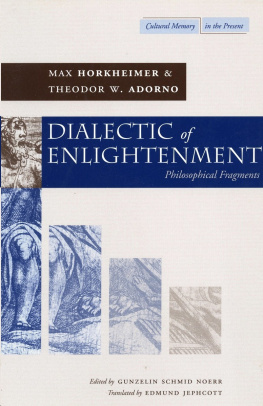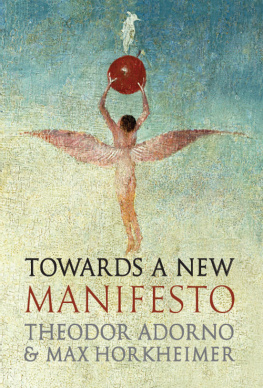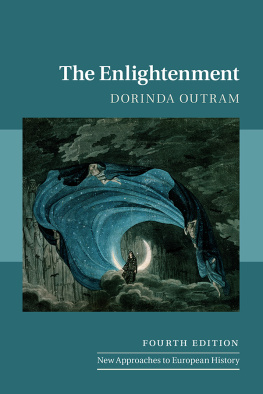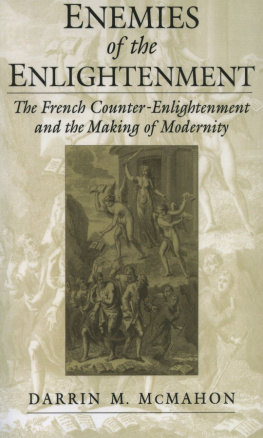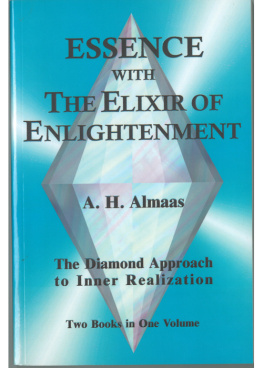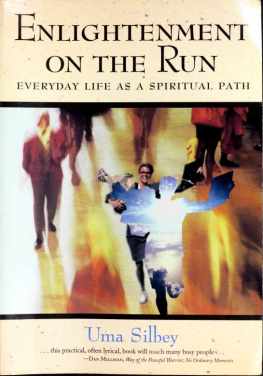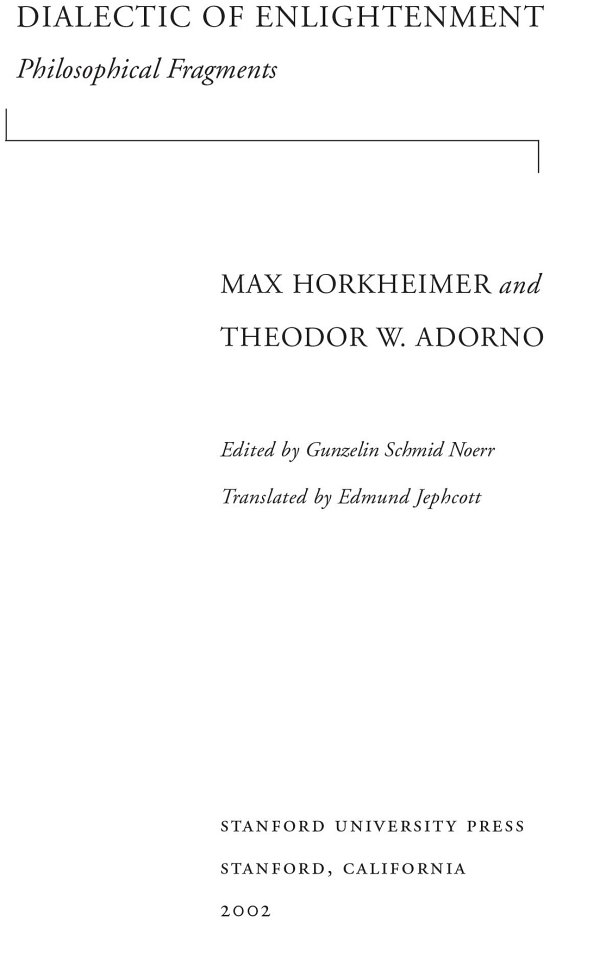Cultural Memory in the Present
Mieke Bal and Hent de Vries, Editors
Dialectic of Enlightenment: Philosophical Fragments is translated from Volume 5 of Max Horkheimer, Gesammelte Schriften: Dialektik der Aufklrung und Schriften 19401950 , edited by Gunzelin Schmid Noerr, 1987 by S. Fishcher Verlag GmbH, Frankfurt am Main.
Asterisks in the text and display material mark editorial notes created for the German edition. They include variant readings and other textual concerns. They are keyed in the reference matter section via the number of the page on which the asterisk appears and the preceding word. Numbered notes are those created by Horkheimer and Adorno themselves.
English translation 2002 by the Board of Trustees of the Leland Stanford Junior University
Horkheimer, Max, 18951973
[Philosophische Fragmente. English]
Dialectic of enlightenment : philosophical fragments / Max Horkheimer and Theodor W. Adorno ; edited by Gunzelin Schmid Noerr ; translated by Edmund Jephcott.
p. cm.(Cultural memory in the present)
Includes bibliographical references.
9780804788090
1. Philosophy. I. Adorno, Theodor W., 19031969. II. Schmid Noerr, Gunzelin. III. Title. IV. Series.
B3279.H8473 P513 2002
193dc21 2002000073
Printed in the United States of America
Original Printing 2002
Last figure below indicates year of this printing:
11 10 09 08 07 06 05 04 03 02
Typeset at Stanford University Press in 11/13.5 Adobe Garamond
For Friedrich Pollock*
Preface to the New Edition (1969)
Dialectic of Enlightenment was published in 1947 by Querido in Amsterdam. The book, which found readers only gradually, has been out of print for some time. We have been induced to reissue it after more than twenty years not only by requests from many sides but by the notion that not a few of the ideas in it are timely now and have largely determined our later theoretical writings. No one who was not involved in the writing could easily understand to what extent we both feel responsible for every sentence. We dictated long stretches together; the Dialectic derives its vital energy from the tension between the two intellectual temperaments which came together in writing it.
We do not stand by everything we said in the book in its original form. That would be incompatible with a theory which attributes a temporal core to truth instead of contrasting truth as something invariable to the movement of history. The book was written at a time when the end of the National Socialist terror was in sight. In not a few places, however, the formulation is no longer adequate to the reality of today. All the same, even at that time we did not underestimate the implications of the transition to the administered world.
In a period of political division into immense blocs driven by an objective tendency to collide, horror has been prolonged. The conflicts in the third world and the renewed growth of totalitarianism are not mere historical interludes any more than, according to the Dialectic , fascism was at that time. Critical thought, which does not call a halt before progress itself, requires us to take up the cause of the remnants of freedom, of tendencies toward real humanity, even though they seem powerless in face of the great historical trend.
The development toward total integration identified in the book has been interrupted but not terminated; it threatens to be consummated by means of dictators and wars. Our prognosis regarding the associated lapse from enlightenment into positivism, into the myth of that which is the case, and finally of the identity of intelligence and hostility to mind, has been overwhelmingly confirmed. Our concept of history does not believe itself elevated above history, but it does not merely chase after information in the positivist manner. As a critique of philosophy it does not seek to abandon philosophy itself.
From America, where the book was written, we returned to Germany with the conviction that, theoretically and practically, we would be able to achieve more there than elsewhere. Together with Friedrich Pollock, to whom the book is dedicated on his seventy-fifth birthday as it was then on his fiftieth, we built up the Institut fr Sozialforschung once again, with the idea of taking further the concepts formulated in Dialectic . In continuing to develop our theory, and in the common experiences connected with it, Gretel Adorno has given us the most valuable assistance, as she did with the first version.
We have made changes far more sparingly than is usual with re-editions of books dating back several decades. We did not want to retouch what we had written, not even the obviously inadequate passages. To bring the text fully up to date with the current situation would have amounted to nothing less than writing a new book. That what matters today is to preserve and disseminate freedom, rather than to accelerate, however indirectly, the advance toward the administered world, we have also argued in our later writings. We have confined ourselves here to correcting misprints and suchlike matters. This restraint has made the book a piece of documentation; we hope that it is also more.
Max Horkheimer Theodor W. Adorno
Frankfurt am Main, April 1969
Preface to the Italian Edition * (1962/1966)
The German text of Dialectic of Enlightenment is a fragment. Begun as early as 1942, during the Second World War, it was supposed to form the introduction to the theory of society and history we had sketched during the period of National Socialist rule. It is self-evident that, with regard to terminology and the scope of the questions investigated, the book is shaped by the social conditions in which it was written.
In keeping with its theme, our book demonstrates tendencies which turn cultural progress into its opposite. We attempted to do this on the basis of social phenomena of the 1930s and 1940s in America. However, to construct a systematic theory which would do justice to the present economic and political circumstances is a task which, for objective and subjective reasons, we are unable to perform today. We are therefore happy that the fragment is appearing in a series devoted predominantly to philosophical questions.
M.H. and T.W.A.
Frankfurt am Main, March 1966
Preface (1944 and 1947)
When* we began this work, the first samples of which we dedicate to Friedrich Pollock, we hoped to be able to present the whole book on his fiftieth birthday. But the further we proceeded with the task the more we became aware of the mismatch between it and our own capabilities. What we had set out to do was nothing less than to explain why humanity, instead of entering a truly human state, is sinking into a new kind of * barbarism. We underestimated the difficulty of dealing with the subject because we still placed too much trust in contemporary consciousness. While we had noted for many years that, in the operations of modern science, the major discoveries are paid for with an increasing* decline of theoretical education, we nevertheless believed that we could follow those operations to the extent of limiting our work primarily to a critique or a continuation of specialist theories. Our work was to adhere, at least thematically, to the traditional disciplines: sociology, psychology, and epistemology.
The fragments we have collected here show, however, that we had to abandon that trust. While attentive cultivation and investigation of the scientific heritageespecially when positivist new brooms have swept it away as useless lumberdoes represent one moment of knowledge, in the present collapse of bourgeois civilization not only the operations but the purpose of science have become dubious. The tireless self-destruction of enlightenment hypocritically celebrated by implacable fascists and implemented by pliable experts in humanity* compels thought to forbid itself its last remaining innocence regarding the habits and tendencies of the Zeitgeist . If public life has reached a state in which thought is being turned inescapably into a commodity and language into celebration of the commodity, the attempt to trace the sources of this degradation must refuse obedience to the current linguistic and intellectual demands before it is rendered entirely futile by the consequence of those demands for world history.

